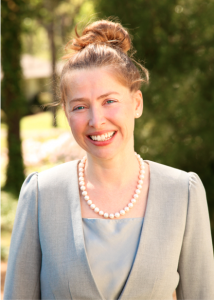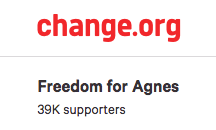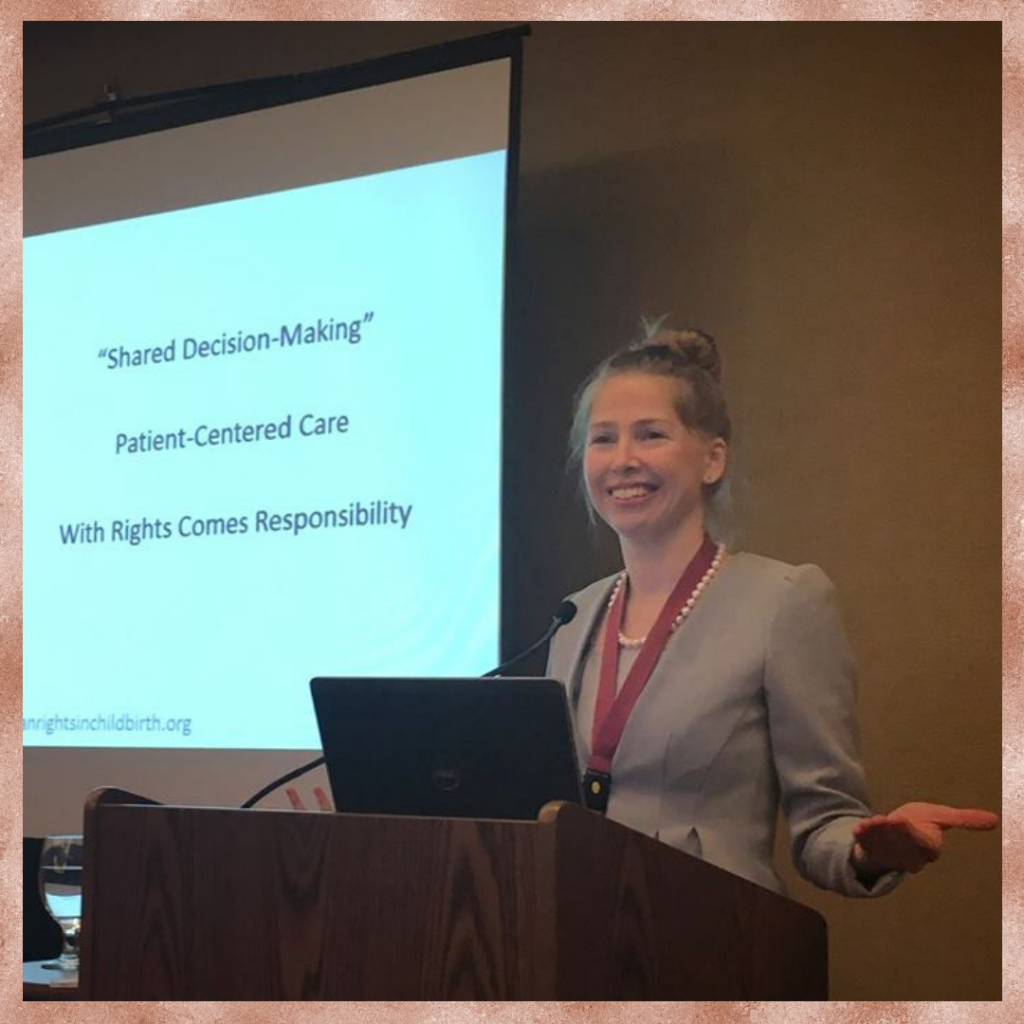![]()
Part I: The Lawyer
Part I is by birth and human rights lawyer Hermine Hayes-Klein, who practices in Portland, Oregon. She originally wrote out this story in a private Facebook post dated October 22, 2018.
I had my first experience as a lawyer-doula last night, and I would like to share it. This is for the doulas, and anybody else interested in human rights in maternity care.
Years ago, after hearing my x-hundredth story of a woman’s rights being violated during childbirth, it occurred to me that many women could use a doula who they could introduce like, “This is my doula… and she’s also my attorney.” The people who say that you shouldn’t need a lawyer in Labor & Delivery haven’t heard the stories I have. But I never offered to serve as a doula myself until last month, when my massage therapist, K, told me a story that made me decide to hang out a shingle (when I update my website) as a lawyer-doula.
K told me that another client of hers, who is also a lawyer, was mistreated during her first birth, is pregnant again, and told K how scared she is that she would be traumatized again during her second birth. K said that she told the client that if anything bad happened, she knew a lawyer who she could call afterward. I said, “That doesn’t make sense, for her to wait until after she’s abused to call me. If she’s really worried about it, I can meet her at the hospital as her doula, and make sure that doesn’t happen.” K’s client hasn’t contacted me for lawyer-doula services, but the conversation opened my willingness to show up for women in that way.
Meanwhile, I have a 20-year-old law client, M, who was brutally assaulted by a nurse during the birth of her first child, about 18 months ago. I am helping her to pursue legal accountability for this traumatizing violation of her right of informed consent and refusal. M is pregnant again, planning a home birth this time, but of course the possibility always exists that she may have to avail herself of hospital services. When we spoke a week or two ago, I could hear in M’s voice how frightened she was at the possibility of having to go to the hospital. I said, “Listen, if you have to go to the hospital for any reason, before, during, or after the birth, you can call me and I will meet you at the hospital, and be your doula.” She cried with relief.
Last night around 7pm, I got a voicemail from M’s young husband, S, saying that they were at the hospital. I called back and he explained that they went in because she had been having contractions that afternoon, premature at 33 weeks, so she had gone to the hospital for assessment and treatment. She had experienced contractions at 33 weeks in her first pregnancy, they had been stabilized with medication, and she had carried her baby to term. He said, “They’re touching her and they weren’t stopping when she asked.” I asked him if she wanted me to come. He checked with her and said, Yes.
So I went to the hospital, and when I entered L&D I asked a nurse to point me to Room 4. She did not look happy, and she made a remark that indicated that she was stressed out about the dynamic with the patient in Room 4. As I walked into M’s room, a nurse walking out returned my smile, and I had the feeling they had sent in their gentlest nurse in response to whatever had occurred before my arrival. I went into the room, and M was reclining on a hospital bed with her sweet husband S in a chair beside her. I remembered how important it was for my midwives to come in quietly when I was in labor, so I came in calm and quiet, smiled at them, and sat quietly until she was clearly not having any contraction and had adjusted to my presence.
I said, “Nobody is going to touch you again without your explicit permission. I am here to ensure that all your rights are respected, including your right to genuine informed consent and refusal. I will make sure that nobody comes into your personal space unless you have welcomed them into that space, even if I have to form a human shield. You can relax completely.” I remembered from an earlier case I worked on, that stress can accelerate preterm labor; it was important for her to feel safe and calm. I addressed S and said that he could relax too, because it was no longer all on him to ensure that M was heard and that her rights were respected. They both looked happier. I put pillows behind M’s head, so that she wouldn’t have to use her neck and shoulder muscles to hold it up in the position she was in. She relaxed more.
The gentle nurse, J, came back into the room, saying “Now there’s a smile! Wow what a change! We haven’t seen that yet!” I felt the tension rise in the room, just from the well-intentioned nurse walking in. She told M that she wanted “to start IV fluids, ok?” I hadn’t yet had any chance to hear from M what was going on clinically, and whether she was comfortable with whatever was happening around that. I said, “Is that what you want? Do you want IV fluids now?” I was conscious that [nurse] J didn’t know who I was, and that I was now raising red bossy-doula flags. M said Yes, IV fluids were fine. I went to the other side of the room while J did her work. When J left, M and S told me what had occurred before I arrived: 3 female nurses and a male OB entered the room to “get M set up” and assess the situation. 2 nurses were touching M at once, one of them jabbing her arm painfully to get an IV port, without success. The OB said that he “needed to do a cervical exam.” M said that she preferred a vaginal exam from a female practitioner. The OB said that there were only male doctors on call that night. M said, “I see three women in this room,” knowing from previous experience that RNs can do cervical exams. One of the nurses then proceeded to do a vaginal exam, reporting the good news that M was only 1cm dilated. While she was doing the vaginal exam, another nurse was pulling out the IV from the arm that didn’t work, while another nurse was prepping M’s other arm to try the IV there. A contraction came, increasing the discomfort and distress of all their touching for M, and the nurses all proceeded despite the contraction. M had enough and said, “All of you please stop touching me right now!” and she was insistent that they stop and step away from her. When one of the nurses did not immediately comply with M’s request to stop touching her, that’s when S called me.
I asked M if she had told any of them what happened in the first birth, or of her history with the violation of bodily autonomy prior to that. She said that she had briefed J—the nurse who was sent in after the first team left—on these events. I asked her if she wanted me to tell them who I was, that I was her lawyer, that I’m here as her doula, and to explain the background to this medical staff, and what she needed from them. She said yes, they wanted me to do that. During this conversation, the male OB poked his head in at one point. He looked nice enough, he looked a little frightened by M’s powerful-woman boundary-setting, and I could tell that he and his team were curious about my role.
I was so proud of my gentle, soft-spoken client for the fact that she had already set her boundaries before I got there, by her using her voice, with just her and her husband present, having pre-term contractions at age 20, saying “NO” and “step back” and “absolutely not” to a room full of medical professionals. During her first birth at 18, she and S didn’t even have the words during labor to understand how their rights were being violated, couldn’t find the words to tell anybody that she had been assaulted. M was so traumatized by the violence of that birth that she hadn’t been able to bond with her baby for months, and was debilitated. M’s sweet baby had loved her out of that trauma, as had her devoted husband. She went through hell, but now she was better, and she would be damned if that was going to happen to her a second time. She looked absolutely beautiful, with no makeup, strong and radiant on her hospital bed. I observed to S how beautiful she looked, and he agreed with me, while looking at M as if he was looking at the light of God.
When J came back in and gave M her medicine to stop the contractions, I introduced myself. I told her the story of what had happened in the first birth, after asking M and S again, in front of J, if they were OK to revisit this story and wanted me to tell it to J and her team. I explained that I was the lawyer who M hired to address that experience. I told her that I was aware that M was pregnant again and planning a home birth, as many women do following an abusive experience during a previous hospital birth, but that of course M might need to avail herself of hospital services at any time. I told her that I had assured M that she could call me any time she needed to, and that I would come as her doula, and would make clear for anybody necessary the relationship between M’s rights, and their efforts to provide her with healthcare. I said, “I’m just here to make sure that M’s right of informed consent and refusal is upheld, and that nobody touches her body without her clear, explicit permission, given freely on the basis of accurate information about her treatment options, and their risks and benefits. In no way do I want to interfere with your clinical relationship.” I said that I would be present so long as M wanted me to be. I made numerous remarks affirming J and her colleagues’ efforts to listen and to provide safe, respectful maternity care, and how much we appreciated that. J said, “Well she certainly looks much happier after you arrived!” I said, “Yes, because she feels safe now. And I know that we both agree that every patient in this hospital, especially those gestating babies, should feel completely safe throughout their care.” I told J that I would be happy to introduce myself to any of her colleagues, and to explain the background and my client’s needs. She said that she would go talk to them and be back to me. I said, “I realize that it may be triggering for them to hear that M has called in her attorney-doula. Please let them know that we are all on the same team, and that I’m happy to discuss the situation with any of them.”
After a bit, J invited me to come out and talk with the charge nurse. I sat down with her and told her the story again, said the same basic stuff. They asked if M was upset about the way she had been treated there so far, and I said: “Any woman who has been assaulted or violated in the past can be alarmed just by your team going about the business of doing your work and trying to provide care. Given that 1 in 3 women have experienced sexual assault or childhood sexual abuse, you can expect that if multiple people are crowding around them and touching them, especially without a lot of communication and listening, they’re going to be triggered.” I said that what was needed was a lot of communication and really clear informed consent. I expressed M’s needs thus, reminding the charge nurse that this applies to all victims of sexual assault, and that because many women don’t disclose their histories, they might want to apply this to everyone:
“If your team could imagine a bubble around M’s body of 3-4 feet. Please do not enter that bubble, with any part of your body or any object, until you have looked her in the eyes, communicated about why you are proposing to enter the bubble, provided her with as much information as she wants about the risks and benefits of her options, and asked her if she is comfortable with you coming into her personal space to do the thing. Then really look at her, pay attention and listen to her. Only if you are sure that she is comfortable with you coming into the bubble, should you enter.”
I won’t say that the nurse looked delighted with my beautiful proposal. But she was agreeable to it. Again, I dropped many affirmations along the way, expressing my assumption that these are all good people, doing good work, and trying to provide quality individualized care. As I stood up, I remarked to the charge nurse how proud I was of my client for the fact that, even after what she had gone through, she had not hesitated to go to the hospital that day when she experienced pre-term cramping. The nurse said, “But of course; she wants her baby to be safe.” I said, “Yes, but as you know, studies from around the world show that fear of disrespect and abuse can cause pregnant women to delay or avoid accessing facility-based care.” She acknowledged this, and we agreed that it was good that M was at their hospital and could receive the care she needed.
I went back into M’s room and told her and S everything that had happened. I lay on the couch for another 45 minutes, breathing slow and grounded to hold the space, listening to M’s stories of how she and her siblings were born, how her mother talks about those births, her grandmother’s births. J came in and out to do her thing, showing respect for the bubble. The medicine was working; the contractions had slowed and were stopping. At 10pm, M said, “I think they’ll be sending me home tonight. I feel comfortable now. If you’re tired, you can go home.” I said, “Are you sure? You get to feel safe. Are you sure that you will feel safe after I leave? Do you feel safe with this team? I believe that they will respect your rights. What do you feel?” She said that the dynamic with them was fine now, and she thought it would continue to be. I told her that she could call me back at any time during the night, and that if any kind of problematic dynamic arose, she could say “Don’t make me call my lawyer back in!” M and S looked happy and comfortable.
I went out to where J was standing by the charge nurse. I said to them, “M feels comfortable and safe that everybody is on the same page with her need for respect and informed consent. She feels really good about the respectful and compassionate care that J has been providing. M doesn’t feel that she needs me here any more. Thank you so much for your sensitivity and quality care.” J said, “She really turned around after you got here! What a change!” The third time she made this point. I reminded her that it’s all about feeling safe, told them to keep up the good work, and went home. I texted with M, who let me know that the medicine had worked, they were finishing the IV fluids, and she would go home that night. So she’s home now, baby is safe inside, and she spent this morning napping with her toddler. I called her today to mirror for her how she stood up for herself last night and how proud of herself she should be. She agreed. She sounded happy.
This morning I told my husband what happened, and he remarked that a lot of the time, people are treated like the lowest common denominator, unless they can produce some “social signifier” that they should be treated better, and that I had served this function for M. That’s why people get fancy cars and fancy clothes, he said. I recognize that the attorney-doula is not an accessible option for most women, and of course shouldn’t be necessary for any. But it still felt real good to see my 20-year-old client empower herself by calling in her lawyer-doula to make her rights clear in L&D, and being able to play that role effectively for her with the team at that hospital. I know it could have gone a lot of different ways, and we were blessed that everyone wanted to make the situation work.
Do I feel like the fact that I was a lawyer added to my client’s sense of security once I arrived? Absolutely. Do I feel that it affected my confidence level in communicating with medical staff on her behalf, not to mention my ability to distill and represent her story? 100%. Do I think that it affected the staff’s ability to hear the things I said and be willing to respect my client’s boundaries effective immediately? It didn’t hurt. These hours were the first and only time that I have leveraged my legal privilege to ensure that a client’s rights were respected in reality during childbirth. It worked out well, in a way that increased my confidence that all doulas have a role to play in helping to ensure that healthcare is provided in a way that respects women’s needs regarding their personal space. ![]()
Part II: The Mother
This is by M, the mom at the center of this story. She wanted to share her name but is precluded because of the status of her lawsuit. She is eager to come forward publicly in the future.
So last night was extremely triggering for me.
With my previous birth, I was heavily abused. Part of my trauma is from being held down and forcibly drugged as well as being forced to sit on a toilet causing a tear near my cervix.
Well, I am currently pregnant again, a little over 33 weeks to be exact. Last night I went into preterm labor and had to go to the hospital. My midwife knows what I went through the first time and recommended a hospital where she thought I would be safe. I arrived and was nervous but hopeful.
They brought my husband and I to a room where he helped me pee in a cup and put a gown on. I looked back at my husband to see if he needed help tying the gown. When I turned back around, trigger number one, a nurse was standing directly in front of me violating my space just as the nurse did with my first birth. She took us back to the bed where I was quickly surrounded by her, two other nurses and a male doctor. They immediately began hooking me up to the fetal monitor and stabbing my arm to get an IV. This wasn’t exactly a trigger but very anxiety inducing and I felt extremely under attack. The nurse trying for an IV spent way too long digging in my arm which was extremely painful especially as I was having contractions. I told her she had to stop.
This whole time the male doctor was trying to tell me he had to do my cervical check [an assessment that would involve his hand in her vagina]. I said no way and of course he asked why. I told him, “because you’re a man”. He rolled his eyes at me and proceded to try to explain that only male doctors were on call tonight and it had to be done. I told him I did not care, he was not going to touch me. As I’m sure you ladies know, any L&D nurse can do a cervical exam, and in that moment I was surrounded by 3 women nurses.
He finally agreed to let a nurse do it, but did not leave the room. She began the exam and another nurse held a heat pack firmly on my arm to make it easier to find a vein. The exam was extremely painful and I asked her to stop, but she didn’t. As I believe anyone’s reaction would be, I tried to pull away. The nurse holding the heat pack on my arm grabbed me harder and actually held my arm down. I began panicking as being held down is a HUGE trigger. I asked that I stopped being touched. The nurse doing the cervical check finally pulled her hand out [of my vagina] but the other nurse would not stop holding down my arm.
I screamed for my husband to call my lawyer as she had told me she would come to the hospital at any time to act as a lawyer-doula to ensure my rights and body were respected, they obviously were not being respected. He left a quick voicemail as I screamed again for them to “stop touching me! Just stop!” Because the nurse still would not stop holding my arm. I could not go anywhere as I was strapped to the monitor and trying to pull my arm back was painful, the nurse was very strong. The entire situation was making contractions worse and I was in full blown panic. After my husband left the voicemail he rushed to my side and demanded that she let go of me as I was screaming, crying, and thrashing on the bed.
As soon as she let go I clutched my husband. All of them left the room and my husband also called the midwife to see if she could come because I was scared to let anyone else touch me. She wasn’t sure if she could make it but said she would try.
Eventually a team of nurses came in again saying there was a shift change. They introduced me to the new nurse and filled her in on how long and how frequently I had been having contractions. She was much more gentle and wary of boundaries than anyone had been since we arrived. The other nurses left and the entire atmosphere changed. I was able to calm down and catch my breath a little.
The lawyer my husband called, called back and said she would be there soon. My husband left the room with the new nurse to try to explain why I had been so upset.
The lawyer arrived and we filled her in. After things were settled she asked if I was comfortable with her introducing herself as my lawyer and doula and explaining to the team the importance of boundaries especially with me as a patient. I said yes and she did as such. She first introduced herself and explained to the nurse who had been coming in then asked if she should speak with the rest of the team. The nurse left and came back and said the doctor was currently in a delivery, but the charge nurse could speak with her. She left the room and spoke with the charge nurse then came back. She said that she felt the charge nurse had understood.
Eventually I was able to leave the hospital after contractions had stopped and my IV bag was empty. I left that hospital feeling heard, supported, and empowered. It started terrible, but I feel like it was a big learning moment for those nurses and doctors. I feel very proud to have been able to really shine a light on obstetric violence for them and remind them that it does happen, it is real, and I will NOT let it happen to me again. I felt very in control and most of all, I felt like person. It is terrible what us women have gone through, but by supporting one another we help each other find our voices again and we can use our voices to make REAL change.
I’m literally sitting here rocking my son to sleep for his nap with happy tears running down my face. It took me so long to find my voice and be able to speak about what happened after being silenced by so many and now to know that my voice will be heard by so many is such an amazing feeling. To be part of the change takes my breath away especially knowing that another woman may read it and be inspired to find her voice like I did.
THIS is what women supporting other women is. THIS is what empowerment is. THIS is how change happens. I walked into that hospital shaking with fear and walked out with my head held high. For the first time I think ever I did not feel the need to apologise for my feelings, for having a panic attack. For the first time I did not feel the need to apologise for using my voice. I am a woman, and damn it you will not only hear my roar but you will listen to it! ![✊]()
![✊]()
Part III: The Commentary
Hi, this is Cristen at Birth Monopoly.
I understand that this story is going to evoke lots of different and strong responses.
I think many birthing women will find this exciting and validating and empowering. They are ultimately who Birth Monopoly is here for.
I think some doulas will find this triggering for various reasons:
- Professional doulas may be frustrated that a story like this further confuses the role of the doula in the birthing room
- More passive doulas may see the direct interactions with medical staff as outside their role and feel it reflects badly on all doulas
- Activist or advocate doulas may be frustrated that this mom couldn’t find or didn’t know to find a professional doula like them to serve this role for her
I would ask all doulas to step back and look at the larger picture of what this mom’s needs were and how those needs were met. And really dig deep about your reaction. What feelings underlie it? What feelings are under those feelings? Do you feel liberated in your role as a doula or constrained? Are you able to use your judgment, be creative, be bold as a doula, or do you feel like you have a script to run when things get tricky? Where does that script come from, or those limits?
The doula role is self-defined. Limits on that role are placed by the system in which doulas work and by organizations representing doulas themselves in an effort to professionalize the role in a medical setting. Ultimately, most doulas are independent professionals who work directly and exclusively for birthing people and, as a profession, have limitless potential to define their own role. In fact, one of the core values of a doula is that they are not beholden to anyone except their client.
How do we really want to define that role, today, in a system where doulas are traumatized by what they witness as their clients are traumatized by what they experience?
It’s a discussion worth having.
Suggested listening for doulas
![]()
![]()
![]()
The post When Your Lawyer is Your Doula appeared first on Birth Monopoly.



![Facebook, Anonymous nurse: I also have a visceral reaction when I have heard mocking of patients birth plans. As a labor nurse I used to get so psychically sick [sic] and angry with other nurses when they made off hand comments about how "the patient with the birth plan always ends up with an epidural and a c/s." I remember being in the morning shift Huddle and hearing the CHARGE nurse starting the mocking and joking about a particular patient and her birth plan, which allowed multiple nurses to add in their cruel comments. I remember calling them out, and being ostracized for it. And I remember volunteering to be assigned to patients with birth plans so I could try to protect them from my coworkers.](http://birthmonopoly.com/bmp/wp-content/uploads/2017/11/Birthplans5.png)












 A word about Diana: When Diana and I met at one of my workshops about legal rights in maternity care about six years ago, she was an associate at a top national law firm and interested in birth issues. In addition to her day job, she immediately joined our small, determined group of advocates to play a leading role helping young mother Kimberly Turbin bring a lawsuit for medical battery after a forced episiotomy. Among her other critical work on Kimberly’s case, Diana was the lawyer who contacted 80-some individuals and organizations to try to convince one of them to represent this woman–ultimately, successfully. Since then, she has moved to Boston to work at another top law firm and then left corporate practice altogether to establish Matrescence, a private doula service supporting women and families through birth and postpartum, and a parallel legal and patient advocacy practice dedicated to women’s rights in childbirth and the practice of midwifery. Diana serves as outside counsel to the Bay State Birth Coalition, a consumer organization advocating for legal recognition of certified professional midwives in Massachusetts. Today, she is a valued source of support to both her doula and legal clients, who range from women and families to midwives and other birth professionals. She now resides in Southeastern Massachusetts with her husband Mike, son Bennett and beloved vizsla, Rocky.
A word about Diana: When Diana and I met at one of my workshops about legal rights in maternity care about six years ago, she was an associate at a top national law firm and interested in birth issues. In addition to her day job, she immediately joined our small, determined group of advocates to play a leading role helping young mother Kimberly Turbin bring a lawsuit for medical battery after a forced episiotomy. Among her other critical work on Kimberly’s case, Diana was the lawyer who contacted 80-some individuals and organizations to try to convince one of them to represent this woman–ultimately, successfully. Since then, she has moved to Boston to work at another top law firm and then left corporate practice altogether to establish Matrescence, a private doula service supporting women and families through birth and postpartum, and a parallel legal and patient advocacy practice dedicated to women’s rights in childbirth and the practice of midwifery. Diana serves as outside counsel to the Bay State Birth Coalition, a consumer organization advocating for legal recognition of certified professional midwives in Massachusetts. Today, she is a valued source of support to both her doula and legal clients, who range from women and families to midwives and other birth professionals. She now resides in Southeastern Massachusetts with her husband Mike, son Bennett and beloved vizsla, Rocky.







